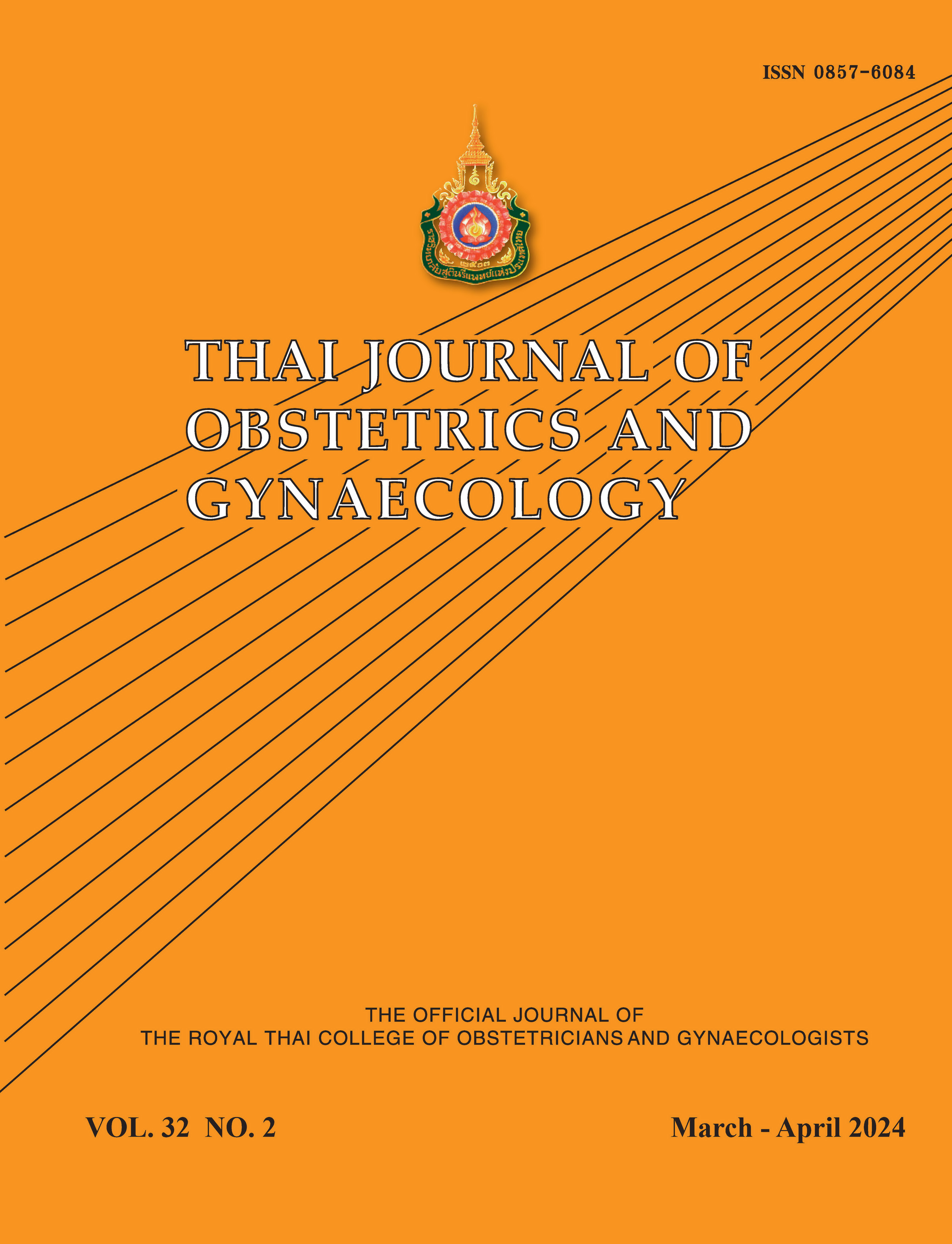Prevalence of Depression and Associated Factors in Postmenopausal Thai Women during the COVID-19 Pandemic
Main Article Content
Abstract
Objectives: To determine the prevalence of and factors associated with depression in postmenopausal Thai women during the COVID-19 pandemic.
Materials and Methods: The study was conducted from April to December 2022. Depression was diagnosed using the Thai Depression Inventory. Self-questionnaires assessed sociodemographic data; COVID-19 knowledge, attitudes, and preventive practices; and Thai Depression Inventory scores.
Results: The study assessed 271 women (175 natural postmenopausal; 96 surgical postmenopausal). The depression prevalence was 9.6% overall, 8.6% in natural menopause, and 11.5% in surgical menopause. No severe major depression was observed. The prevalence of mild depression was significantly higher in the surgical postmenopausal group (11.5%) than in the natural postmenopausal group (4.0%, p = 0.022). In the natural postmenopausal group, the prevalence of less than major depression and major depression were 4% and 0.6%, respectively, whereas it was not present in the surgical postmenopausal group. Women with superior knowledge or attitudes had a lower prevalence. Those with high levels of preventive behavior had a higher prevalence but without significance. Prevalence significantly increased with low household income and medical disease, especially chronic kidney disease.
Conclusion: The prevalence of depression in postmenopausal Thai women during COVID-19 was 9.6%. Low household income and chronic kidney disease were significant predictors.
Article Details

This work is licensed under a Creative Commons Attribution-NonCommercial-NoDerivatives 4.0 International License.
References
Wu YC, Chen CS, Chan YJ. The outbreak of COVID-19: An overview. J Chin Med Assoc 2020;83:217-20.
Parasher A. COVID-19: Current understanding of its Pathophysiology, Clinical presentation and Treatment. Postgrad Med J 2021;97:312-20.
Perrotta F, Corbi G, Mazzeo G, Boccia M, Aronne L, D’Agnano V, et al. COVID-19 and the elderly: insights into pathogenesis and clinical decision-making. Aging Clin Exp Res 2020;32:1599-608.
Marome W, Shaw R. COVID-19 Response in Thailand and Its implications on future preparedness. Marome W, Shaw R. COVID-19 Response in Thailand and Its implications on future preparedness. Int J Environ Res Public Health 2021;18:1089.
Wang C, Pan R, Wan X, Tan Y, Xu L, Ho CS, et al. Immediate psychological responses and associated factors during the initial stage of the 2019 coronavirus disease (COVID-19) epidemic among the general population in China. Int J Environ Res Public Health 2020;17:1729.
Kongsuk T, Supanya S, Kenbubpha K, Phimtra S, Sukhawaha S, Leejongpermpoon J. Services for depression and suicide in Thailand. WHO South East Asia J Public Health 2017;6:34-8.
Kułak-Bejda A, Krajewska-Ferishah K, Szyszko-Perłowska A, Waszkiewicz N. Risk Assessment of depression amongst women during menopause before and during the COVID-19 pandemic. Int J Environ Res Public Health 2022;20:596.
Khatak S, Gupta M, Grover S, Aggarwal N. Depression among peri- and post-menopausal women during COVID-19 pandemic in Chandigarh, North India: A Study from Community. J Midlife Health 2022;13:233-40.
Afshari P, Abedi P, Sarizadeh R, Maniati M. Evaluation of depression, stress, and anxiety among women with subfertility during the COVID-19 pandemic: A cross-sectional study in Ahvaz, Iran. Health Sci Rep 2023;6:e967.
Cybulska AM, Głębicka K, Stanisławska M, Cymbaluk-Płoska A, Grochans E, Rachubińska K. The relationship between social support and mental health problems of peri- and postmenopausal women during the SARS-CoV-2 pandemic. Int J Environ Res Public Health 2023;20:2501.
Wangtongkum S, Sucharitakul P, Wongjaroen S, Maneechompoo S. Prevalence of depression among a population aged over 45 years in Chiang Mai, Thailand. J Med Assoc Thai 2008;91:1812-6.
Clayton AH, Ninan PT. Depression or menopause? Presentation and management of major depressive disorder in perimenopausal and postmenopausal women. Prim Care Companion J Clin Psychiatry 2010;12:PCC.08r00747.
Soares CN. Can depression be a menopause-associated risk? BMC Medicine 2010;8:79.
Taylor HS, Pal L, Seli E. Speroff’s clinical gynecologic endocrinology and infertility. 9th ed. Philadelphia: Wolters Kluwer 2020.
Zhong B-L, Luo W, Li H-M, Zhang Q-Q, Liu X-G, Li W-T, et al. Knowledge, attitudes, and practices towards COVID-19 among Chinese residents during the rapid rise period of the COVID-19 outbreak: a quick online cross-sectional survey. Int J Biol Sci 2020;16:1745–52.
Khumsaen N. Knowledge, attitudes, and preventive behaviors of COVID-19 among people living in Amphoe U-thong, Suphanburi Province. J Prachomklao Coll Nurs Phetchaburi 2021;4: 33-48.
Lotrakul M, Sukanich P. Development of the Thai Depression Inventory. J Med Assoc Thai 1999;82: 1200-7.
Rajatanavin N, Tuangratananon T, Suphanchaimat R, Tangcharoensathien V. Responding to the COVID-19 second wave in Thailand by diversifying and adapting lessons from the first wave. BMJ Global Health 2021;6:e006178
Tangcharoensathien V, Vandelaer J, Brown R, Suphanchaimat R, Boonsuk P, Patcharanarumol W. Learning from pandemic responses: Informing a resilient and equitable health system recovery in Thailand. Front Public Health 2023;11:1065883.
Potts MK, Daniels M, Burnam MA, Wells KB. A structured interview version of the Hamilton Depression Rating Scale: evidence of reliability and versatility of administration. J Psychiatr Res 1990;24:335-50.
Ahlawat P, Singh MM, Garg S, Mala YM. Prevalence of depression and its association with sociodemographic factors in postmenopausal women in an urban resettlement colony of Delhi. J Midlife Health 2019;10:33-6.
An SY, Kim Y, Kwon R, Lim GY, Choi HR, Namgoung S, et al. Depressive symptoms and suicidality by menopausal stages among middle-aged Korean women. Epidemiol Psychiatr Sci 2022;31:e60.
Chiang H-H, Livneh H, Yen M-L, Li T-C, Tsai T-Y. Prevalence and correlates of depression among chronic kidney disease patients in Taiwan. BMC Nephrology 2013;14:78-85.
Lin KY-H, Chou C-Y, Chang CY-Y, Lin W-C, Wan L. Association between oophorectomy and depression in patients with comorbidities: A nationwide cohort study in Taiwan. Taiwan J Obstet Gynecol 2020;59: 899-905.
Gibson CJ, Joffe H, Bromberger JT, Thurston RC, Lewis TT, Khalil N, et al. Mood symptoms after natural menopause and hysterectomy with and without bilateral oophorectomy among women in midlife. Obstet Gynecol 2012;119:935-41.


